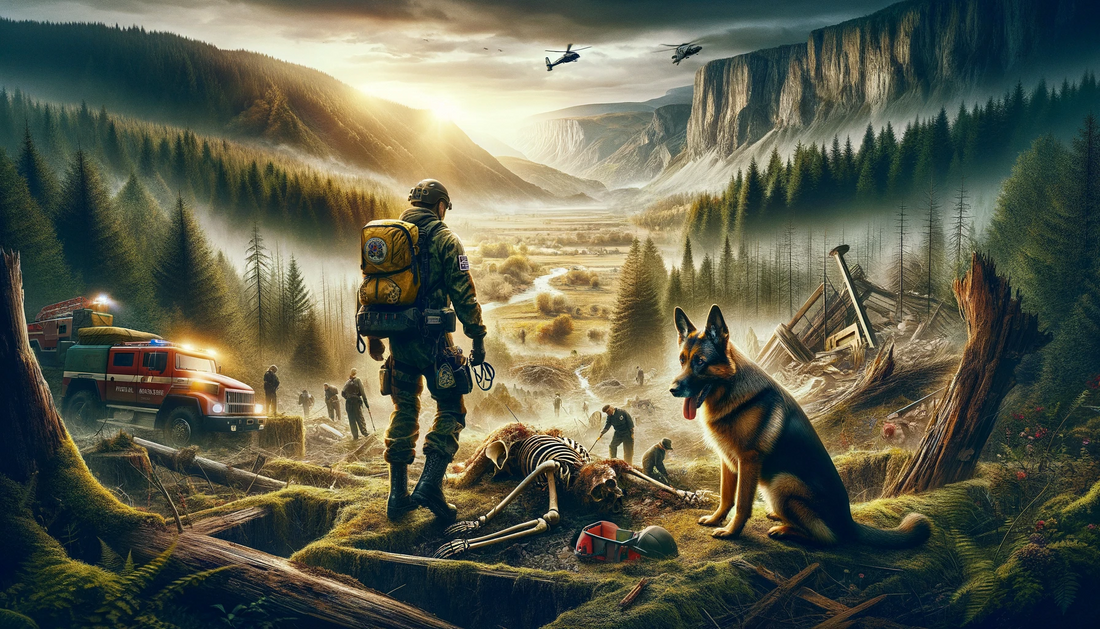
Unveiling the Heroes: The Vital Role of Search and Rescue and Cadaver Dogs
Partager
Welcome to a world where four-legged heroes play a critical role in life-saving missions and solving mysteries. In this blog post, we dive into the fascinating world of Search and Rescue (SAR) and Cadaver dogs, exploring their invaluable contributions and how they help in various situations.
Search and Rescue dogs are trained to locate individuals lost in wilderness, disasters, or other emergencies. These dogs are often the first line of hope in finding missing people alive. On the other hand, Cadaver dogs, also known as Human Remains Detection (HRD) dogs, specialize in locating deceased individuals, playing a crucial role in forensic investigations and closure for families.
The training of these canine heroes is extensive. SAR dogs undergo rigorous programs to master skills like tracking, trailing, and area searching. They're trained to work in challenging terrains and harsh weather conditions. Cadaver dogs, conversely, are trained to detect the scent of human decomposition, which includes a wide range of scents from different stages of decomposition.
SAR dogs have been instrumental in locating lost hikers, earthquake survivors, and avalanche victims. Their ability to navigate through debris and cover large areas rapidly makes them invaluable in disaster response.
Cadaver dogs contribute significantly to forensic science. They assist in crime scene investigations, unmarked grave detection, and in recovering remains after disasters. Their acute sense of smell enables them to locate remains that are often missed by human searchers.
The success of these dogs heavily relies on the bond they share with their handlers. This relationship is built on trust, mutual respect, and extensive training together. Handlers need to understand canine behavior and psychology, and often, these teams train for months, if not years, to perfect their skills.
Working as a SAR or Cadaver dog handler is both rewarding and challenging. It requires emotional resilience, especially for Cadaver dog handlers who often work in somber and sensitive environments.
If you're interested in becoming a handler, start by volunteering with local SAR organizations. Gain experience in dog handling and training, and learn about the specific requirements of SAR and Cadaver dogs. It's a path that demands dedication, patience, and a passion for making a difference.
Search and Rescue and Cadaver dogs are more than just pets; they are partners and heroes in their own right. Their contributions not only save lives but also bring solace to countless families. In the realm of public safety and forensic science, these dogs prove time and again that the nose knows best.
In celebrating these canine heroes, we acknowledge their unwavering dedication and the significant impact they have in our world. They remind us of the extraordinary things that can be achieved through the partnership of humans and dogs.
As you marvel at the remarkable capabilities of SAR and Cadaver dogs, have you ever considered being a part of such a dynamic team? Joining a Search and Rescue team offers an incredible opportunity to make a significant impact in your community. It's not just about being a handler; SAR teams need a diverse range of skills, from logistics to medical expertise. Whether you're inspired to train a canine hero or support operations in other capacities, your contribution can save lives and bring hope in desperate times. If this sparks a sense of adventure and purpose in you, we encourage you to reach out to local SAR organizations and discover how you can be part of these heroic missions. Remember, every member plays a vital role in the success of a SAR operation!